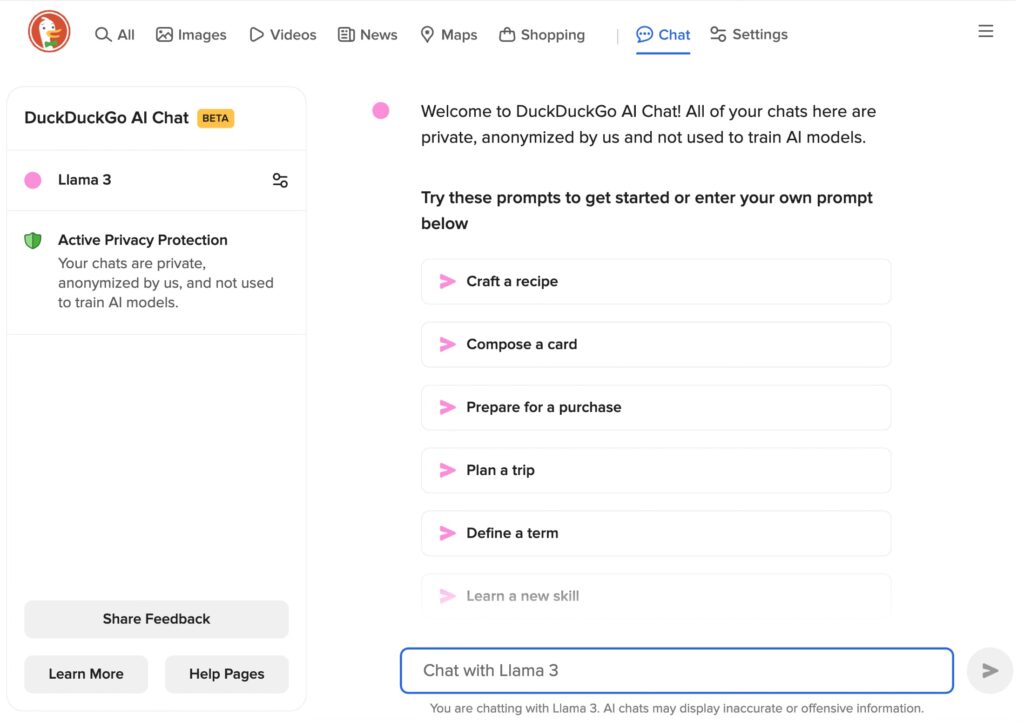DuckDuckGo has launched a platform that allows users to interact privately with popular AI chatbots, ensuring their data is safe and protected.
Accessible at Duck.ai, the service is available globally and has a lightweight, clean user interface. Users can choose from four AI models: two closed-source models – GPT-3.5 Turbo from OpenAI and Claude 3 Haiku from Anthropic, and two open-source models – Llama-3 70B from Meta and Mixtral 8x7b from Mistral AI.
What sets DuckDuckGo AI Chat apart is its focus on user privacy: Neither DuckDuckGo nor chatbot providers can train their models with user data, so interactions remain private and anonymous. DuckDuckGo also removes metadata such as servers and IP addresses, so queries appear to come from the company itself rather than individual users.
The company has contracts with all model providers to ensure that any stored chats are permanently deleted within 30 days and that chats conducted on the platform are not used to train or improve models, making it easier to protect your privacy than changing the privacy settings on each service.
In an era when online services are craving user data, DuckDuckGo's AI chat service is a breath of fresh air. The company's commitment to privacy is a direct response to growing concerns about data collection and use in the AI industry. By providing a private, anonymous platform where users can interact with AI chatbots, DuckDuckGo is setting a new standard in the industry.
DuckDuckGo's AI service is free to use within daily limits, but the company is considering introducing paid plans to reduce or eliminate these limits. The service is designed to be a complementary partner to the search engine, allowing users to switch between search and AI chat for a more comprehensive search experience.
“We see AI Chat and Search as different but powerful tools to help you find what you're looking for, especially when you're exploring a new topic. Sometimes you're shopping or doing research for a project and aren't sure how to get started. In these situations, either AI Chat or Search can be a good starting point,” the company explains.
“You can start by asking a few questions in the AI chat, and the answers may inspire a traditional search, leading you to track down reviews, prices, and other primary sources of information. If you start with a search, you might switch to the AI chat for follow-up queries that help you understand what you read, or for quick, direct answers to new questions that weren't addressed on the web pages you viewed.”
To accommodate this user workflow, DuckDuckGo has made AI chat quickly accessible through DuckDuckGo Private Search.
The release of DuckDuckGo AI Chat comes at a time when the AI industry is facing increased scrutiny over data privacy and usage. The service follows crypto entrepreneur Erik Voorhees' recent release of Venice AI, a welcome addition for privacy-conscious individuals. Venice AI features an uncensored AI chatbot and image generator that doesn't require an account or retain any data.
As the AI industry continues to evolve, it's clear that privacy will remain a top concern for users, and with the release of DuckDuckGo AI Chat, the company is taking a big step towards providing users with a private and secure platform to interact with AI chatbots.
reference: AI pioneers turn whistle-blower, demand safeguards

Want to learn more about AI and big data from industry leaders? Check out the AI & Big Data Expo in Amsterdam, California and London – this comprehensive event will take place alongside other major events such as Intelligent Automation Conference, BlockX, Digital Transformation Week and Cyber Security & Cloud Expo.
Find out about upcoming enterprise technology events and webinars hosted by TechForge here.


